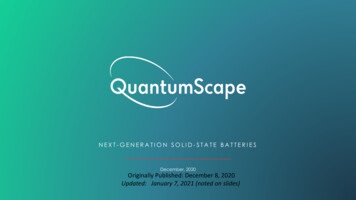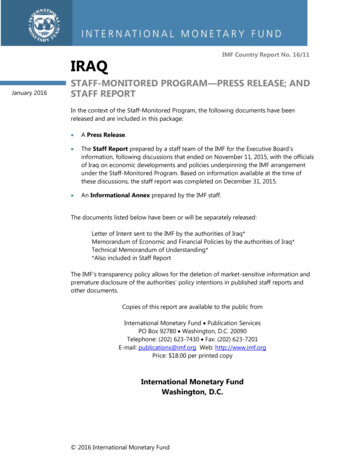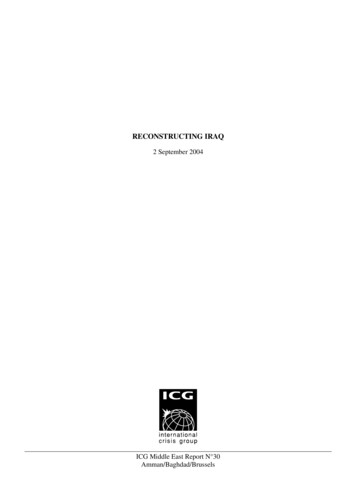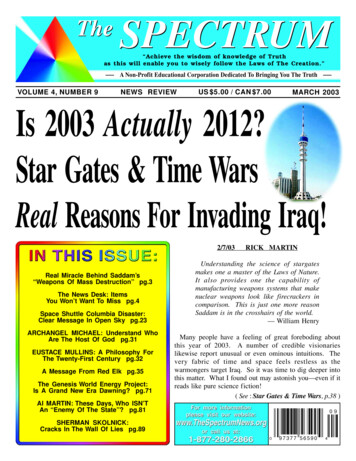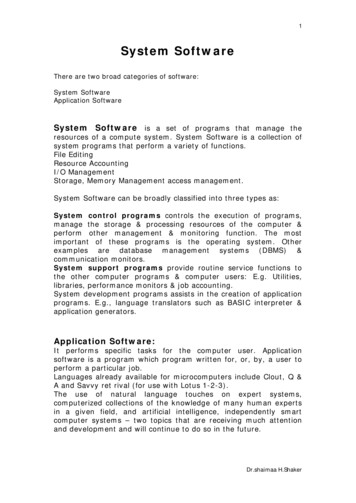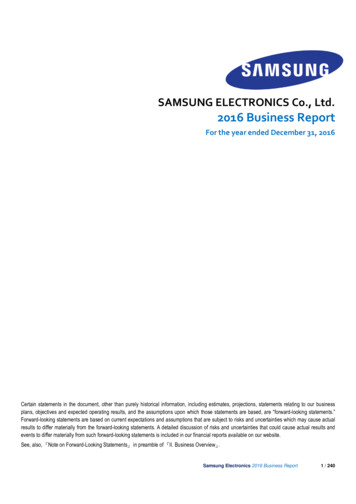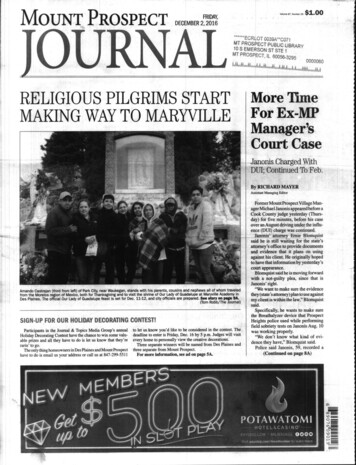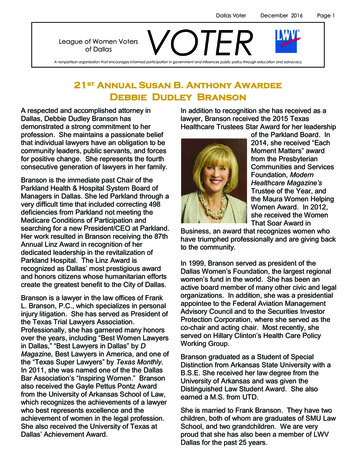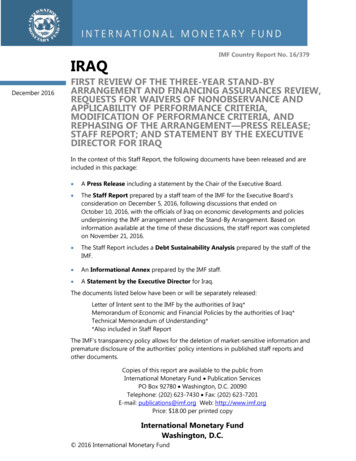
Transcription
IMF Country Report No. 16/379IRAQDecember 2016FIRST REVIEW OF THE THREE-YEAR STAND-BYARRANGEMENT AND FINANCING ASSURANCES REVIEW,REQUESTS FOR WAIVERS OF NONOBSERVANCE ANDAPPLICABILITY OF PERFORMANCE CRITERIA,MODIFICATION OF PERFORMANCE CRITERIA, ANDREPHASING OF THE ARRANGEMENT—PRESS RELEASE;STAFF REPORT; AND STATEMENT BY THE EXECUTIVEDIRECTOR FOR IRAQIn the context of this Staff Report, the following documents have been released and areincluded in this package: A Press Release including a statement by the Chair of the Executive Board. The Staff Report prepared by a staff team of the IMF for the Executive Board’sconsideration on December 5, 2016, following discussions that ended onOctober 10, 2016, with the officials of Iraq on economic developments and policiesunderpinning the IMF arrangement under the Stand-By Arrangement. Based oninformation available at the time of these discussions, the staff report was completedon November 21, 2016. The Staff Report includes a Debt Sustainability Analysis prepared by the staff of theIMF. An Informational Annex prepared by the IMF staff. A Statement by the Executive Director for Iraq.The documents listed below have been or will be separately released:Letter of Intent sent to the IMF by the authorities of Iraq*Memorandum of Economic and Financial Policies by the authorities of Iraq*Technical Memorandum of Understanding**Also included in Staff ReportThe IMF’s transparency policy allows for the deletion of market-sensitive information andpremature disclosure of the authorities’ policy intentions in published staff reports andother documents.Copies of this report are available to the public fromInternational Monetary Fund Publication ServicesPO Box 92780 Washington, D.C. 20090Telephone: (202) 623-7430 Fax: (202) 623-7201E-mail: publications@imf.org Web: http://www.imf.orgPrice: 18.00 per printed copyInternational Monetary FundWashington, D.C. 2016 International Monetary Fund
Press Release No. 16/540FOR IMMEDIATE RELEASEDecember 5, 2016International Monetary FundWashington, D.C. 20431 USAIMF Executive Board Completes First Review of Iraq’s Stand-By ArrangementThe Executive Board of the International Monetary Fund (IMF) today completed the firstreview of Iraq’s three-year Stand-By Arrangement (SBA), which is designed to supportIraq’s economic reform program and restore fiscal balance over the medium term. The Boardalso completed financing assurances review under the SBA. The SDR 3.831 billionarrangement (about US 5.34 billion at the time of approval) was approved in July, 2016 (SeePress Release No. 16/321). The Board’s approval enables the disbursement of SDR 455million (about US 617.8 million).As part of the completion of the first review, the Board also approved Iraq’s request for awaiver for the non-observance of the continuous ceiling on new external arrears, and requestto modify performance criteria. The Board also approved the request for a waiver ofapplicability for end of September targets of four performance criteria on the floor on grossinternational reserves (GIR) of the Central Bank of Iraq (CBI), the ceiling on net domesticassets (NDA) of the CBI, the ceiling on the stock of outstanding arrears to international oilcompanies and the ceiling on the stock of gross public debt, as well as a request for therephasing of the arrangement.Iraq’s economic reform program supported by the SBA aims to address the urgent balance ofpayments need, bring spending in line with lower global oil prices, and ensure debtsustainability. The program also includes measures to protect the poor, strengthen publicfinancial management, enhance financial sector stability, and curb corruption. Iraq willrequire the support of the international community to implement these policies.Following the Executive Board’s decision, Mr. Mitsuhiro Furusawa, Deputy ManagingDirector and Acting Chair of the Board, issued the following statement:“The economic policies implemented by the Iraqi authorities to deal with the shocks facingIraq—the armed conflict with ISIS and the ensuing humanitarian crisis and the collapse in oilprices—are appropriate. In the fiscal area, the authorities are implementing a sizable fiscaladjustment, mostly through retrenchment of inefficient capital expenditure while protectingsocial spending. In the external area, the authorities are maintaining the peg of the Iraqi dinar
2to the U.S. dollar, which provides a key anchor to the economy. Performance under theStand-By Arrangement has been mixed; however, understandings have been reached onsufficient corrective actions to keep the program on track. Resolute implementation, togetherwith strong international support, will be key.“The revised fiscal program in 2016 and the draft budget in 2017 are aligned with the SBA.The composition of the fiscal adjustment should be improved over time by increasing non-oilrevenue and reducing current expenditure, including the payroll and pension payments, andreforming the electricity sector, subsidies, and state-owned enterprises, in order to makeroom for larger but more effective and efficient investment expenditure that is conducive togrowth.“Significantly improving public financial management will be important. Arrears need to beassessed and paid following verification, and expenditure commitment and cash managementshould be strengthened to prevent the accumulation of new arrears.“Measures to bolster financial sector stability include strengthening the legal framework ofthe Central Bank of Iraq, restructuring state-owned banks, and eliminating exchangerestrictions. Measures to prevent money-laundering, counter the financing of terrorism, andstrengthen the anti-corruption legislation also need to be implemented.“Implementation of the budget-sharing agreement with the Kurdistan Regional Governmentwould put both the federal government and the Kurdistan Regional Government in a betterposition to address the shocks to the Iraqi economy.”
IRAQNovember 21, 2016FIRST REVIEW OF THE THREE-YEAR STAND-BY ARRANGEMENTAND FINANCING ASSURANCES REVIEW, REQUESTS FORWAIVERS OF NONOBSERVANCE AND APPLICABILITY OFPERFORMANCE CRITERIA, MODIFICATION OF PERFORMANCECRITERIA, AND REPHASING OF THE ARRANGEMENTKEY ISSUESContext: Iraq is adjusting to a double shock arising from the ISIS attacks and the sharpdrop in global oil prices. The conflict has hurt the economy through displacement andimpoverishment of millions of people, and destruction of infrastructure and assets. Theoil price decline has resulted in a massive reduction in budget revenue, pushing thefiscal deficit to an unsustainable level. The authorities are responding to the crisis with amix of necessary fiscal adjustment and financing, maintaining their commitment to theexchange rate peg. The peg provides a key nominal anchor in a highly uncertainenvironment with policy capacity weakened by the war against ISIS.First Review Under the SBA. To help address this double shock, the authoritiesrequested a Stand-By Arrangement (SBA) that the IMF Executive Board approved inJuly 2016 with access of SDR 3,831 million (230 percent of quota). Two performancecriteria (PCs) at end September appear to have been met on the basis of preliminaryunaudited data and there is no data available yet to assess the other PCs. One PC couldnot be monitored as designed at end-September. One PC at end-June 2016 was missed.One continuous PC was missed. Completion of some structural benchmarks was delayed,but progress is being made for each. Hence, program performance has been mixed butunderstandings on sufficient corrective actions have been reached to put the programback on track.Outlook and Risks. With the current outlook for moderately higher oil prices, andassuming that the authorities implement the programmed fiscal consolidation, the budgetdeficit of 12 percent of GDP in 2015 can be eliminated by 2020, the public debt-to-GDPratio stabilized by 2018, and the balance of payments brought back into surplus by 2021.But risks remain very high, arising primarily from a further fall in oil prices, setbacks in thewar against ISIS, political tensions, and weak administrative capacity.Key Policy Recommendations: Implement the revised 2016 fiscal program and the 2017 budget introduced toparliament in order to set the stage for restoring fiscal balance over the medium term. Protect social spending. Step up efforts to identify arrears already accumulated and prevent the accumulationof new ones. Complete the audits of the state-owned banks that dominate the banking system.
IRAQApproved ByAasim M. Husain andVitaliy KramarenkoDiscussions took place in Amman during August 25–September 10, 2016,and in Washington, D.C. during October 6–10, 2016. Staff representativescomprised Christian Josz (head), Ritu Basu, Amgad Hegazy (all MCD),Csaba Feher (FAD), Christiane Kneer (SPR), and Marwa Alnasaa (ResidentRepresentative for Iraq based in Amman). Maya Choueiri (Senior Advisor,OED) joined the mission. Cecilia Pineda and Gregory Basile assisted in thepreparation of the report.CONTENTSBACKGROUND: IRAQ IS FACING AN ACUTE FISCAL AND BALANCE OF PAYMENTS CRISIS 4A. Background 4B. Recent Economic Developments 5C. Performance Under the Stand-By Arrangement (SBA) 7D. Outlook 9ECONOMIC POLICIES TO ADDRESS THE CRISIS 11A. Managing External Pressures 11B. Implementing Fiscal Consolidation to Achieve Debt Sustainability 12C. Strengthening Public Financial Management 17D. Monitoring Financial Risks to Preserve Financial Sector Stability 17PROGRAM MODALITIES AND RISKS 18STAFF APPRAISAL 20FIGURE1. Recent Economic Developments and Outlook, 2013–21 6TABLES1.2.3.4.5.6.7.8.9.10.2Selected Economic and Financial Indicators, 2013–21 23National Accounts, 2013–21 24Central Government Fiscal Accounts, 2013–21 (In trillions of ID) 25Central Government Fiscal Accounts, 2013–21 (In percent of GDP) 26Central Government Fiscal Accounts, 2013–21 (In percent of non-oil GDP) 27Balance of Payments, 2013–21 28Monetary Survey, 2013–21 29Central Bank Balance Sheet, 2013–21 30Proposed Schedule of Reviews and Purchases Under the Stand-By Arrangement, 2016–19 31Indicators of Fund Credit, 2015–21 32INTERNATIONAL MONETARY FUND
IRAQ11. Total Financing Requirements and Sources, 2016–19 3312. Reserve Adequacy Indicators, 2013–21 34ANNEXI.Public and External Debt Sustainability Analysis 38APPENDICESI. Letter from the Prime MinisterII. Letter of IntentAttachment I. Memorandum on Economic and Financial PoliciesAttachment II. Technical Memorandum of UnderstandingINTERNATIONAL MONETARY FUND454648813
IRAQBACKGROUND: IRAQ IS FACING AN ACUTE FISCALAND BALANCE OF PAYMENTS CRISIS1.The economy has been hit hard by the collapse in oil prices and the ISIS attacks.Although slightly higher since the approval of the SBA,1 Iraqi oil prices have remained at aboutone-third of their level in 2013 (Table 1). The ongoing armed conflict with ISIS continues to strain thecountry’s resources and is resulting in new waves of internally displaced people.A. Background2.Iraqi forces are making progress in retaking territories controlled by ISIS. After regainingcontrol of Ramadi and Fallujah, the Iraqi army and its international partners have started a majormilitary operation to retake control of Mosul, Iraq’s second largest city.3.The recent offensive to retake Mosul is expected to increase the need for humanitarianassistance. The war against ISIS has boosted the number of internally displaced persons to 3.3 millionand the number of people in need of humanitarian assistance to 10 million (26 percent of the population)including 225,000 Syrian refugees (Memorandum of Economic and Financial Policies—MEFP, ¶3).4.The political situation remains unstable. Since the SBA approval, the Interior Minister resignedin the aftermath of a terrorist attack that claimed the lives of more than 300 people and Parliamentwithdrew its confidence in the Defense and Finance Ministers. In the face of such political instability,subsequent to the SBA approval, the Prime Minister decided to reverse the tax increase for senior civilservants that the Council of Ministers had approved as a prior action before the approval of the SBArequest (¶14).5.Relations between the federal government in Baghdad and the Kurdistan RegionalGovernment (KRG) have improved. Both governments are closely collaborating in the offensive toretake control of Mosul (¶2). In August 2016, the federal government and the KRG agreed to resumeoil exports by the North Oil Company through the pipeline linking the KRG to Turkey in an amount of0.15 million barrels per day (mbpd) and to equally split the export revenue u
2. Iraqi forces are making progress in retaking territories controlled by ISIS. After regaining control of Ramadi and Fallujah, the Iraqi army and its international partners have started a major military operation to retake control of Mosul, Iraq’s second largest city. 3. The recent offensive to retake Mosul is expected to increase the need for humanitarian
